- Home
- George Orwell
Orwell in Spain Page 25
Orwell in Spain Read online
Page 25
The whole process is easy to understand if one remembers that it proceeds from the temporary alliance that Fascism, in certain forms, forces upon the bourgeois and the worker. This alliance, known as the Popular Front, is in essential an alliance of enemies, and it seems probable that it must always end by one partner swallowing the other. The only unexpected feature in the Spanish situation – and outside Spain it has caused an immense amount of misunderstanding – is that among the parties on the Government side the Communists stood not upon the extreme Left, but upon the extreme Right. In reality this should cause no surprise, because the tactics of the Communist Party elsewhere, especially in France, have made it clear that official Communism must be regarded, at any rate for the time being, as an anti-revolutionary force. The whole of Comintern policy is now subordinated (excusably, considering the world situation) to the defence of the USSR, which depends upon a system of military alliances. In particular, the USSR is in alliance with France, a capitalist-imperialist country. The alliance is of little use to Russia unless French capitalism is strong, therefore Communist policy in France has got to be anti-revolutionary. This means not only that French Communists now march behind the tricolour and sing the Marseillaise, but, what is more important, that they have had to drop all effective agitation in the French colonies. It is less than three years since Thorez, the Secretary of the French Communist Party, was declaring that the French workers would never be bamboozled into fighting against their German comrades;1 he is now one of the loudest-lunged patriots in France. The clue to the behaviour of the Communist Party in any country is the military relation of that country, actual or potential, towards the USSR. In England, for instance, the position is still uncertain, hence the English Communist Party is still hostile to the National Government, and, ostensibly, opposed to re-armament. If, however, Great Britain enters into an alliance or military understanding with the USSR, the English Communist, like the French Communist, will have no choice but to become a good patriot and imperialist; there are premonitory signs of this already. In Spain the Communist ‘line’ was undoubtedly influenced by the fact that France, Russia’s ally, would strongly object to a revolutionary neighbour and would raise heaven and earth to prevent the liberation of Spanish Morocco. The Daily Mail, with its tales of red revolution financed by Moscow, was even more wildly wrong than usual. In reality it was the Communists above all others who prevented revolution in Spain. Later, when the Right-wing forces were in full control, the Communists showed themselves willing to go a great deal further than the Liberals in hunting down the revolutionary leaders.2
I have tried to sketch the general course of the Spanish revolution during its first year, because this makes it easier to understand the situation at any given moment. But I do not want to suggest that in February I held all of the opinions that are implied in what I have said above. To begin with, the things that most enlightened me had not yet happened, and in any case my sympathies were in some ways different from what they are now. This was partly because the political side of the war bored me and I naturally reacted against the viewpoint of which I heard most – i.e. the POUM–ILP viewpoint. The Englishmen I was among were mostly ILP members, with a few CP members among them, and most of them were much better educated politically than myself. For weeks on end, during the dull period when nothing was happening round Huesca, I found myself in the middle of a political discussion that practically never ended. In the draughty evil-smelling barn of the farm-house where we were billeted, in the stuffy blackness of dug-outs, behind the parapet in the freezing midnight hours, the conflicting party ‘lines’ were debated over and over. Among the Spaniards it was the same, and most of the newspapers we saw made the inter-party feud their chief feature. One would have had to be deaf or an imbecile not to pick up some idea of what the various parties stood for.
From the point of view of political theory there were only three parties that mattered, the PSUC, the POUM, and the CNT–FAI, loosely described as the Anarchists. I take the PSUC first, as being the most important; it was the party that finally triumphed, and even at this time it was visibly in the ascendant.
It is necessary to explain that when one speaks of the PSUC ‘line’ one really means the Communist Party ‘line’. The PSUC (Partido Socialista Unificado de Cataluña) was the Socialist Party of Catalonia; it had been formed at the beginning of the war by the fusion of various Marxist parties, including the Catalan Communist Party, but it was now entirely under Communist control and was affiliated to the Third International. Elsewhere in Spain no formal unification between Socialists and Communists had taken place, but the Communist viewpoint and the Right-wing Socialist viewpoint could everywhere be regarded as identical. Roughly speaking, the PSUC was the political organ of the UGT (Unión General de Trabajadores), the Socialist trade unions. The membership of these unions throughout Spain now numbered about a million and a half. They contained many sections of the manual workers, but since the outbreak of war they had also been swollen by a large influx of middle-class members, for in the early ‘revolutionary’ days people of all kinds had found it useful to join either the UGT or the CNT. The two blocks of unions overlapped, but of the two the CNT was more definitely a working-class organisation. The PSUC was therefore a party partly of the workers and partly of the small bourgeoisie – the shopkeepers, the officials, and the wealthier peasants.
The PSUC ‘line’, which was preached in the Communist and pro-Communist press throughout the world, was approximately this:
‘At present nothing matters except winning the war; without victory in the war all else is meaningless. Therefore this is not the moment to talk of pressing forward with the revolution. We can’t afford to alienate the peasants by forcing collectivisation upon them, and we can’t afford to frighten away the middle classes who are fighting on our side. Above all for the sake of efficiency we must do away with revolutionary chaos. We must have a strong central government in place of local committees, and we must have a properly trained and fully militarised army under a unified command. Clinging on to fragments of workers’ control and parroting revolutionary phrases is worse than useless; it is not merely obstructive, but even counter-revolutionary, because it leads to divisions which can be used against us by the Fascists. At this stage we are not fighting for the dictatorship of the proletariat, we are fighting for parliamentary democracy. Whoever tries to turn the civil war into a social revolution is playing into the hands of the Fascists and is in effect, if not in intention, a traitor.’
The POUM ‘line’ differed from this on every point except, of course, the importance of winning the war. The POUM (Partido Obrero de Unificación Marxista) was one of those dissident Communist parties which have appeared in many countries in the last few years as a result of the opposition to ‘Stalinism’; i.e. to the change, real or apparent, in Communist policy. It was made up partly of ex-Communists and partly of an earlier party, the Workers’ and Peasants’ Bloc. Numerically it was a small party,1 with not much influence outside Catalonia, and chiefly important because it contained an unusually high proportion of politically conscious members. In Catalonia its chief stronghold was Lérida. It did not represent any block of trade unions. The POUM militiamen were mostly CNT members, but the actual party-members generally belonged to the UGT. It was, however, only in the CNT that the POUM had any influence. The POUM ‘line’ was approximately this:
‘It is nonsense to talk of opposing Fascism by bourgeois “democracy”. Bourgeois “democracy” is only another name for capitalism, and so is Fascism; to fight against Fascism on behalf of “democracy” is to fight against one form of capitalism on behalf of a second which is liable to turn into the first at any moment. The only real alternative to Fascism is workers’ control. If you set up any less goal than this, you will either hand the victory to Franco, or, at best, let in Fascism by the back door. Meanwhile the workers must cling to every scrap of what they have won; if they yield anything to the semi-bourgeois Government they can dep
end upon being cheated. The workers’ militias and police-forces must be preserved in their present form and every effort to “bourgeoisify” them must be resisted. If the workers do not control the armed forces, the armed forces will control the workers. The war and the revolution are inseparable.’
The Anarchist viewpoint is less easily defined. In any case the loose term ‘Anarchists’ is used to cover a multitude of people of very varying opinions. The huge block of unions making up the CNT (Confederación Nacional del Trabajo), with round about two million members in all, had for its political organ the FAI (Federación Anarquista Ibérica), an actual Anarchist organisation. But even the members of the FAI, though always tinged, as perhaps most Spaniards are, with the Anarchist philosophy, were not necessarily Anarchists in the purest sense. Especially since the beginning of the war they had moved more in the direction of ordinary Socialism, because circumstances had forced them to take part in centralised administration and even to break all their principles by entering the Government. Nevertheless they differed fundamentally from the Communists in so much that, like the POUM, they aimed at workers’ control and not a parliamentary democracy. They accepted the POUM slogan: ‘The war and the revolution are inseparable,’ though they were less dogmatic about it. Roughly speaking, the CNT–FAI stood for: (1) Direct control over industry by the workers engaged in each industry, e.g. transport, the textile factories, etc.; (2) Government by local committees and resistance to all forms of centralised authoritarianism; (3) Uncompromising hostility to the bourgeoisie and the Church. The last point, though the least precise, was the most important. The Anarchists were the opposite of the majority of so-called revolutionaries in so much that though their principles were rather vague their hatred of privilege and injustice was perfectly genuine. Philosophically, Communism and Anarchism are poles apart. Practically – i.e. in the form of society aimed at – the difference is mainly one of emphasis, but it is quite irreconcilable. The Communist’s emphasis is always on centralism and efficiency, the Anarchist’s on liberty and equality. Anarchism is deeply rooted in Spain and is likely to outlive Communism when the Russian influence is withdrawn. During the first two months of the war it was the Anarchists more than anyone else who had saved the situation, and much later than this the Anarchist militia, in spite of their indiscipline, were notoriously the best fighters among the purely Spanish forces. From about February 1937 onwards the Anarchists and the POUM could to some extent be lumped together. If the Anarchists, the POUM and the Left wing of the Socialists had had the sense to combine at the start and press a realistic policy, the history of the war might have been different. But in the early period, when the revolutionary parties seemed to have the game in their hands, this was impossible. Between the Anarchists and the Socialists there were ancient jealousies, the POUM, as Marxists, were sceptical of Anarchism, while from the pure Anarchist standpoint the ‘Trotskyism’ of the POUM was not much preferable to the ‘Stalinism’ of the Communists. Nevertheless the Communist tactics tended to drive the two parties together. When the POUM joined in the disastrous fighting in Barcelona in May, it was mainly from an instinct to stand by the CNT, and later, when the POUM was suppressed, the Anarchists were the only people who dared to raise a voice in its defence.
So, roughly speaking, the alignment of forces was this. On the one side the CNT–FAI, the POUM, and a section of the Socialists, standing for workers’ control: on the other side the Right-wing Socialists, Liberals, and Communists, standing for centralised government and a militarised army.
It is easy to see why, at this time, I preferred the Communist viewpoint to that of the POUM. The Communists had a definite practical policy, an obviously better policy from the point of view of the common sense which looks only a few months ahead. And certainly the day-to-day policy of the POUM, their propaganda and so forth, was unspeakably bad; it must have been so, or they would have been able to attract a bigger mass-following. What clinched everything was that the Communists – so it seemed to me – were getting on with the war while we and the Anarchists were standing still. This was the general feeling at the time. The Communists had gained power and a vast increase of membership partly by appealing to the middle classes against the revolutionaries, but partly also because they were the only people who looked capable of winning the war. The Russian arms and the magnificent defence of Madrid by troops mainly under Communist control had made the Communists the heroes of Spain. As someone put it, every Russian aeroplane that flew over our heads was Communist propaganda. The revolutionary purism of the POUM, though I saw its logic, seemed to me rather futile. After all, the one thing that mattered was to win the war.
Meanwhile there was the diabolical inter-party feud that was going on in the newspapers, in pamphlets, on posters, in books – everywhere. At this time the newspapers I saw most often were the POUM papers, L a Battalla and Adelante, and their ceaseless carping against the ‘counterrevolutionary’ PSUC struck me as priggish and tiresome. Later, when I studied the PSUC and Communist press more closely, I realised that the POUM were almost blameless compared with their adversaries. Apart from anything else, they had much smaller opportunities. Unlike the Communists, they had no footing in any press outside their own country, and inside Spain they were at an immense disadvantage because the press censorship was mainly under Communist control, which meant that the POUM papers were liable to be suppressed or fined if they said anything damaging. It is also fair to the POUM to say that though they might preach endless sermons on revolution and quote Lenin ad nauseam, they did not usually indulge in personal libel. Also they kept their polemics mainly to newspaper articles. Their large coloured posters, designed for a wider public (posters are important in Spain, with its large illiterate population), did not attack rival parties, but were simply anti-Fascist or abstractly revolutionary; so were the songs the militiamen sang. The Communist attacks were quite a different matter. I shall have to deal with some of these later in this book. Here I can only give a brief indication of the Communist line of attack.
On the surface the quarrel between the Communists and the POUM was one of tactics. The POUM was for immediate revolution, the Communist not. So far so good; there was much to be said on both sides. Further, the Communists contended that the POUM propaganda divided and weakened the Government forces and thus endangered the war; again, though finally I do not agree, a good case could be made out for this. But here the peculiarity of Communist tactics came in. Tentatively at first, then more loudly, they began to assert that the POUM was splitting the Government forces not by bad judgment but by deliberate design. The POUM was declared to be no more than a gang of disguised Fascists, in the pay of Franco and Hitler, who were pressing a pseudo-revolutionary policy as a way of aiding the Fascist cause. The POUM was a ‘Trotskyist’ organisation and ‘Franco’s Fifth Column’. This implied that scores of thousands of working-class people, including eight or ten thousand soldiers who were freezing in the front-line trenches and hundreds of foreigners who had come to Spain to fight against Fascism, often sacrificing their livelihood and their nationality by doing so, were simply traitors in the pay of the enemy. And this story was spread all over Spain by means of posters, etc., and repeated over and over in the Communist and pro-Communist press of the whole world. I could fill half a dozen books with quotations if I chose to collect them.
This, then, was what they were saying about us: we were Trotskyists, Fascists, traitors, murderers, cowards, spies, and so forth. I admit it was not pleasant, especially when one thought of some of the people who were responsible for it. It is not a nice thing to see a Spanish boy of fifteen carried down the line on a stretcher, with a dazed white face looking out from among the blankets, and to think of the sleek persons in London and Paris who are writing pamphlets to prove that this boy is a Fascist in disguise. One of the most horrible features of war is that all the war-propaganda, all the screaming and lies and hatred, comes invariably from people who are not fighting. The PSUC militiamen whom I knew
in the line, the Communists from the International Brigade whom I met from time to time, never called me a Trotskyist or a traitor; they left that kind of thing to the journalists in the rear. The people who wrote pamphlets against us and vilified us in the newspapers all remained safe at home, or at worst in the newspaper offices of Valencia, hundreds of miles from the bullets and the mud. And apart from the libels of the inter-party feud, all the usual war-stuff, the tub-thumping, the heroics, the vilification of the enemy – all these were done, as usual, by people who were not fighting and who in many cases would have run a hundred miles sooner than fight. One of the dreariest effects of this war has been to teach me that the Left-wing press is every bit as spurious and dishonest as that of the Right.1 I do earnestly feel that on our side – the Government side – this war was different from ordinary, imperialistic wars; but from the nature of the war-propaganda you would never have guessed it. The fighting had barely started when the newspapers of the Right and Left dived simultaneously into the same cesspool of abuse. We all remember the Daily Mail’s poster: ‘REDS CRUCIFY NUNS,’ while to the Daily Worker Franco’s Foreign Legion was ‘composed of murderers, white-slavers, dope-fiends and the offal of every European country’. As late as October 1937 the New Statesman was treating us to tales of Fascist barricades made of the bodies of living children (a most unhandy thing to make barricades with), and Mr Arthur Bryant was declaring that ‘the sawing-off of a Conservative tradesman’s legs’ was ‘a commonplace’ in Loyalist Spain. The people who write that kind of stuff never fight; possibly they believe that to write it is a substitute for fighting. It is the same in all wars; the soldiers do the fighting, the journalists do the shouting, and no true patriot ever gets near a front-line trench, except on the briefest of propaganda-tours. Sometimes it is a comfort to me to think that the aeroplane is altering the conditions of war. Perhaps when the next great war comes we may see that sight unprecedented in all history, a jingo with a bullet-hole in him.

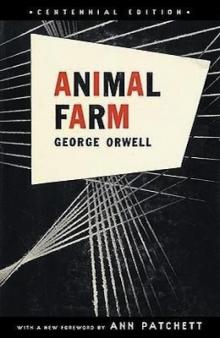 Animal Farm & 1984
Animal Farm & 1984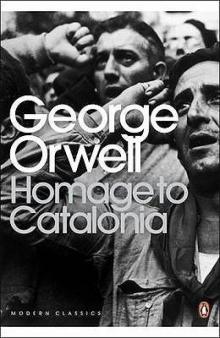 Homage to Catalonia
Homage to Catalonia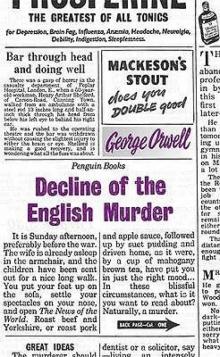 Decline of the English Murder
Decline of the English Murder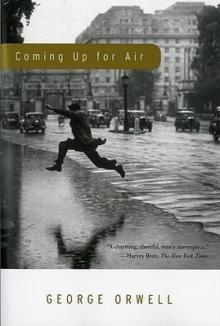 Coming Up for Air
Coming Up for Air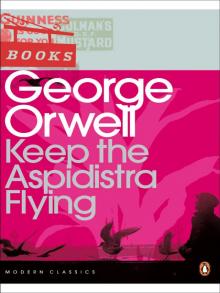 Keep the Aspidistra Flying
Keep the Aspidistra Flying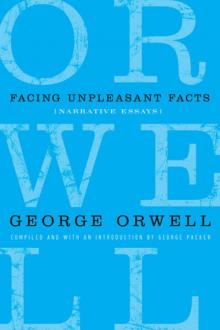 Facing Unpleasant Facts: Narrative Essays
Facing Unpleasant Facts: Narrative Essays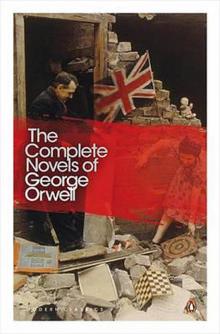 The Complete Novels of George Orwell
The Complete Novels of George Orwell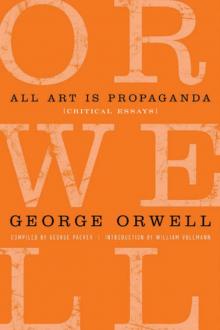 All Art Is Propaganda: Critical Essays
All Art Is Propaganda: Critical Essays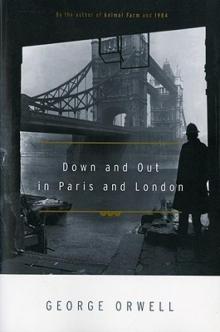 Down and Out in Paris and London
Down and Out in Paris and London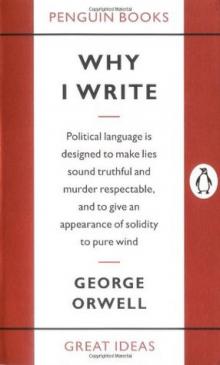 Why I Write
Why I Write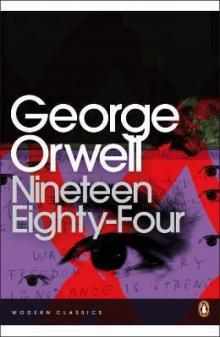 Nineteen Eighty-Four
Nineteen Eighty-Four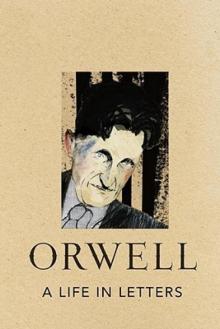 A Life in Letters
A Life in Letters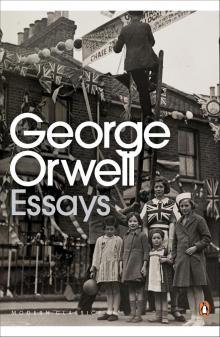 Essays
Essays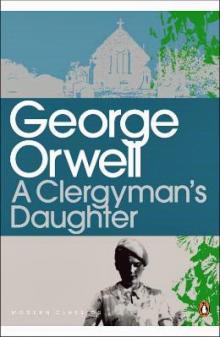 A Clergyman's Daughter
A Clergyman's Daughter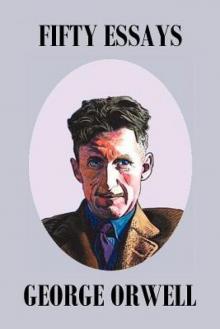 Fifty Orwell Essays
Fifty Orwell Essays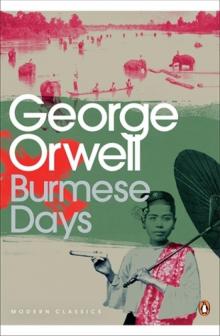 Burmese Days
Burmese Days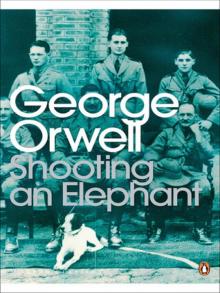 Shooting an Elephant
Shooting an Elephant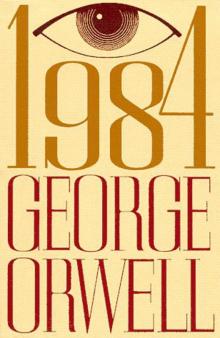 1984 (Penguin)
1984 (Penguin)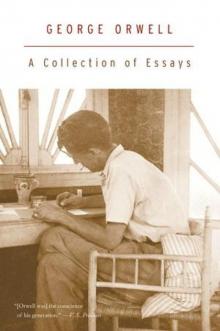 A Collection of Essays
A Collection of Essays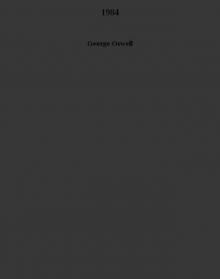 1984
1984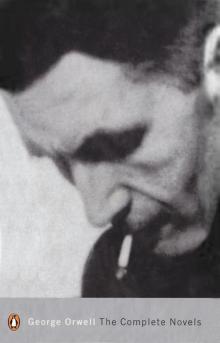 The Complete Novels
The Complete Novels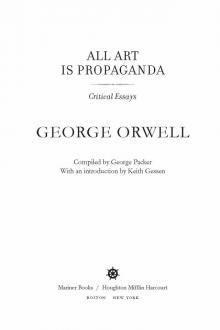 All Art Is Propaganda
All Art Is Propaganda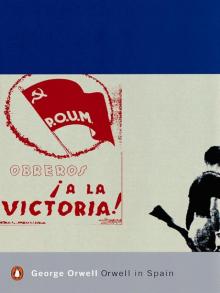 Orwell in Spain
Orwell in Spain Animal Farm: A Fairy Story
Animal Farm: A Fairy Story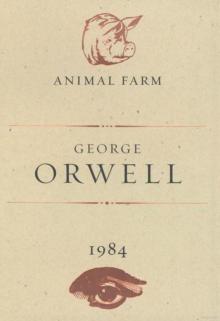 Animal Farm and 1984
Animal Farm and 1984